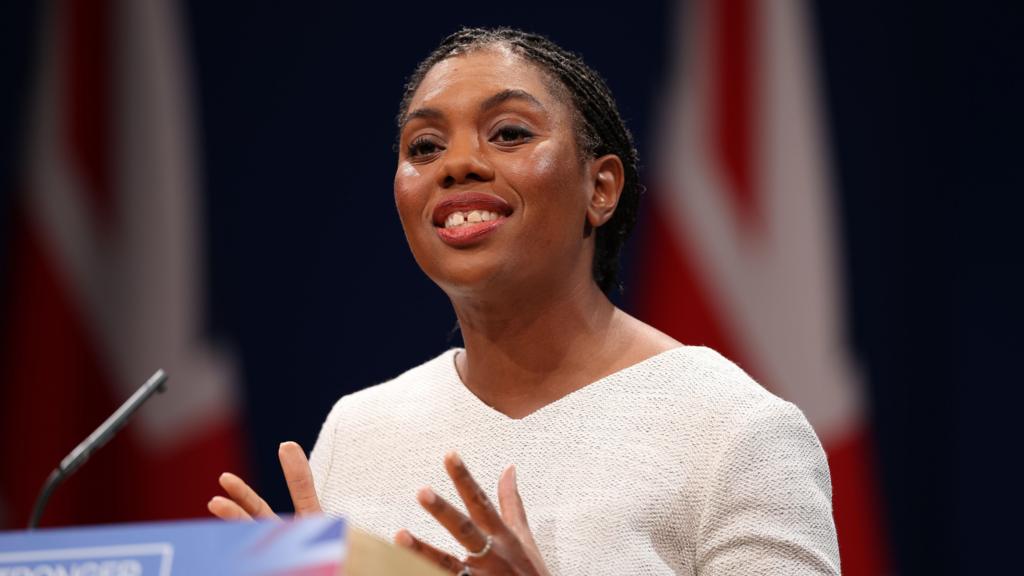In a surprise announcement capping her inaugural conference address as party leader, Kemi Badenoch declared that a future Conservative government would abolish stamp duty on primary residences.
Badenoch’s announcement was met with a standing ovation from Conservative activists in Manchester as she asserted, “That is how we will help achieve the dream of home ownership for millions.”
She stated that eliminating stamp duty – a tax levied on home buyers in England and Northern Ireland – would “unlock a fairer and more aspirational society” and benefit individuals across all age demographics.
The announcement followed a speech replete with new policy proposals intended to capture political attention and delineate clear distinctions with her political rivals.
Badenoch faced pressure to deliver a defining speech, aiming to quell speculation regarding potential leadership challenges amidst the party’s lagging poll numbers behind Labour and Reform UK.
Her 45-minute address, punctuated with anecdotes and humor, resonated well with the audience, filling the hall to near-capacity – a stark contrast to attendance levels at some other speeches during the week.
In a distinct departure from the leaders’ speeches at the Labour and Liberal Democrat conferences, Badenoch referenced Reform only twice.
Instead, she focused her critique on Labour, accusing Sir Keir Starmer of presiding over a “weak and directionless” government that was creating “one hell of a mess” of the country.
The stamp duty announcement was strategically withheld until its delivery, with Badenoch telling party members, “Stamp duty is a bad tax.”
“We must free up our housing market, because a society where no-one can afford to buy or move is a society where social mobility is dead.”
Stamp duty applies to home purchases exceeding £125,000 in England and Northern Ireland; however, first-time buyers are exempt on properties valued up to £300,000.
For higher-value properties, buyers pay a percentage of the home’s value.
Reports suggested that Chancellor Rachel Reeves was considering stamp duty reform in the November budget, although Badenoch alleged that Reeves planned to significantly increase the tax.
Under the Conservative proposals, stamp duty would be entirely abolished on “primary residences,” while the tax would remain applicable to additional properties, purchases by companies, and non-UK residents.
The Scottish and Welsh Conservative parties have affirmed that they would replicate the cut if elected in Scotland and Wales, where similar taxes apply to property transactions.
The Conservatives estimate that abolishing stamp duty on main homes after 2029 would cost the Treasury £9 billion annually.
The Institute for Fiscal Studies estimates the direct cost of the cut might be around £10.5-11 billion per year by that point, also factoring in costs in Scotland and Wales.
Researchers at the think tank also added the Tories’ cost estimate was not “unreasonably low,” considering the uncertainty in predicting future house purchases and property price trends.
Badenoch asserted that the funds to fulfill this pledge would come from £47 billion in planned savings, announced earlier in the week, from cuts to the welfare budget, foreign aid, and Civil Service expenditures.
The Conservative leader vowed that in office, her party would allocate half of all savings to reducing the deficit, the difference between government spending and tax revenue.
Badenoch described this pledge as a “golden rule” of any future Conservative government, as she seeks to restore economic credibility and position her party as the responsible steward of public finances.
In her conference address, Badenoch claimed the Conservative Party was “fizzing with ideas” to remedy the “broken model” she believes is holding the country back.
She pledged to reverse several government policies, spanning from new employment rights to VAT on private school fees.
She highlighted key policy announcements made by the party this week, including:
Her commitment to eliminate the “family farm tax” garnered enthusiastic applause, and proposals to reduce welfare spending and withdraw the UK from the European Convention on Human Rights were also well-received.
In a sustained critique of the Labour government, she stated, “All they have delivered is a doom loop of higher taxes, weaker borders, and month after month of chaos.”
“They had a plan to win, but no plan for power.”
“No vision for Britain. They know how to make promises, but not how to deliver them.”
Acknowledging the Conservatives’ unfavorable opinion poll numbers and recent losses in local elections, she admitted that voters were “still angry” with her party.
And in a remark aimed at Reform, she stated that this had led to “parties that in normal times would never be seen as a serious option for government are gaining ground, making promises they will never be able to keep.”
However, the primary objective of the speech was to underscore that the Conservative Party is under new leadership – one prepared to make “bold” and “tough” decisions that her opponents would not.
Shadow Home Secretary Chris Philp also pledges “negative net migration” if the Tories win the next election.
Shadow housing secretary Sir James Cleverly pledges to rewrite the London Plan to pave the way for new homes.
Tories fear they face an existential threat from Reform UK but opinion is divided on how to fight back.
On Monday, shadow chancellor Mel Stride gave his speech to a partially empty hall in Manchester.
At their autumn conference, MPs discuss how to manage the huge challenges facing the Tories.

